| Srl | Item |
| 1 |
ID:
119193
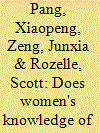

|
|
|
|
|
| Publication |
2013.
|
| Summary/Abstract |
Officials in China claim that voting rates in rural village elections are high. However, the true voting rate is lower, especially for women. We postulate that women are less likely to vote owing to insufficient knowledge about their rights. The objective of this paper is to test whether the knowledge levels of women and village leaders about women's voting rights can affect women's voting behaviour. We report on the results of a randomized controlled trial (RCT) involving 700 women in China's Fujian and Liaoning provinces. Villages were randomly assigned to either a control group or one of three intervention groups. One intervention provided voting training to women only, another provided training to both women and village leaders, and the third provided training to village leaders only. After women received training, their scores on a test of voting knowledge increased, and they more fully exercised their voting rights. When only village leaders were trained, test scores and voting behaviour were not statistically different from the control villages.
|
|
|
|
|
|
|
|
|
|
|
|
|
|
|
|
| 2 |
ID:
101271
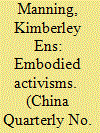

|
|
|
|
|
| Publication |
2010.
|
| Summary/Abstract |
In this article I re-think the complex legacies of the Maoist era and their relationship to the contemporary decline in rural women's leadership. By focusing on some of the gendered dimensions of rural development policy, it becomes evident that many "traditional" beliefs about the leadership abilities of rural women were given new life during the Maoist era. Prior to the Cultural Revolution rural women had two dominant paths of "liberation" or jiefang available to them: one that involved a liberation through the female body and household, the path of dangjia, and one that involved a liberation from the constraints of the female body and household, the path of fanshen. In this article I show how the simultaneous implementation of these two paths of liberation on a unique women-led Mu Guiying Brigade during the Great Leap Forward reproduced the problem of the political unacceptability of rural women.
|
|
|
|
|
|
|
|
|
|
|
|
|
|
|
|
| 3 |
ID:
127153
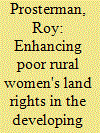

|
|
|
| 4 |
ID:
092217
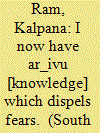

|
|
|
|
|
| Publication |
2009.
|
| Summary/Abstract |
During the 1980s and 1990s, I developed a familiarity with a very specific sub-culture in Tamil Nadu-the Catholic fishing communities of Kanyakumari, who live in a string of sandy villages stretching from the Cape itself, up to the border with Kerala. I was at this point particularly interested in popular religion and its construction of the female body. Following on from that interest, and set off against the backdrop of a familiarity with the social life of these villages, I began a series of wide-ranging sets of interviews with women I already knew on the ways they framed their experiences of puberty and maternity. The interviews threw up, as I had suspected, an intersecting range of discursive frames. And the book I will eventually bring out on this topic will be as much about the relationship between different kinds of intellectuals and rural people as it will be about female experiences per se. The interviews were deliberately conducted with those active in non-government organisations (NGOs) run by Catholic organisations in the district, as well as with school teachers, priests, midwives and healers of different kinds, with doctors, as well as with ordinary women from different age sets.
|
|
|
|
|
|
|
|
|
|
|
|
|
|
|
|
| 5 |
ID:
178391
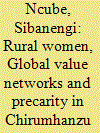

|
|
|
|
|
| Summary/Abstract |
In 1991 Zimbabwe liberalised its economy. This resulted in the opening of the national economy to foreign investment. In line with this, subcontracting arrangements between international corporations and local commodity producers became prevalent. While this attracted scholarly interest, most of it is on global agricultural value networks. By tracing the integration of rural women knitters into international markets, this article offers a different case study. While integration into the knitwear global value chain afforded the women an opportunity to earn an income, their employment remained precarious. This article draws on archival data and interviews from participants to make its case.
|
|
|
|
|
|
|
|
|
|
|
|
|
|
|
|
| 6 |
ID:
092471


|
|
|